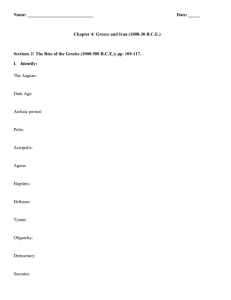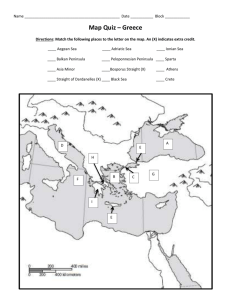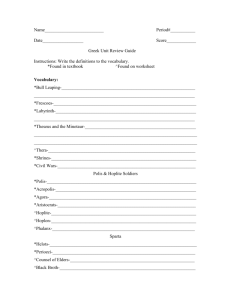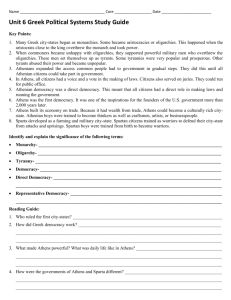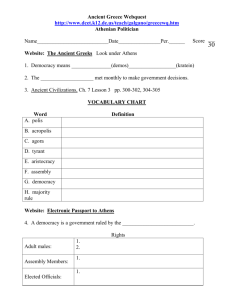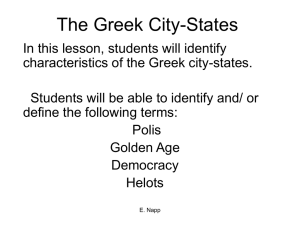BELL QUIZ: USE PAGES 106-109
advertisement
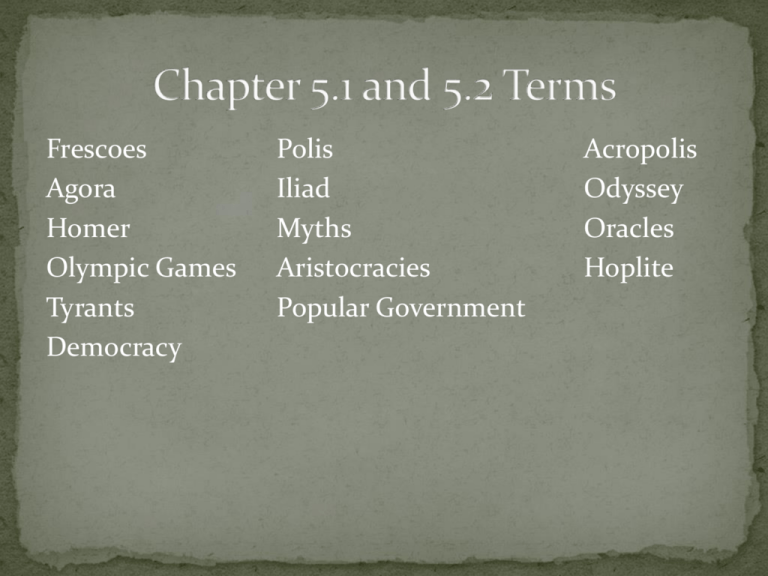
Frescoes Agora Homer Olympic Games Tyrants Democracy Polis Iliad Myths Aristocracies Popular Government Acropolis Odyssey Oracles Hoplite Sea: 85 miles wide from coast to coast. Sea traders Land: Mountains separated communities and made it difficult to unite Greece under 1 government. Poor transportation: 7 days to travel 60 miles. Little farmable land. Climate: Warm all year. Favorable for outdoor leisure activities. Leading city on the Greek mainland. Ruled by a warrior king who had absolute power. The warrior king controlled local production and commercial trade. Led their armies throughout the peninsula and the mainland to rob and plunder . Greek word for city-state is polis. A polis is an absolutely independent and self-sufficient community. Small area. Population less than 10,000. Most were slaves and noncitizens (didn’t own land). Built on a acropolis (hill) Each had an agora (marketplace) for selling goods and holding public meetings to discuss important matters. Considered all non-Greeks to be barbarians. Polis’ were each ruled in many different ways: 1. Monarchy: King/Queen rule (Mycenae) 2. Aristocracy: Nobles rule (Athens) Hereditary and based on land ownership. Wealth and social status supports rulers authority. 3. Oligarchy: Government ruled by a few powerful citizens (Sparta 800-600 B.C.) Rule is based on wealth. Rulers control the military. 4. Tyranny: Powerful individual who gains control of the government. Dictatorship 5. Democracy: State ruled by a small group of citizens (Athens 461 B.C.) Rule is based on citizenship (free adult males). Majority rules. Minoans Location Dates Mycenaeans Crete Greek Mainland, Crete 2000 B.C.-1500 B.C. 1600 B.C.-1200 B.C. Achievements Indoor running water, art, trade network, navy, written language Built fort-like cities throughout Greece, kept written records Reason For Collapse Volcanic eruption, tidal waves Earthquakes, war Use textbook pages 121-125 to create a timeline showing the significant events of the Persian Wars. Make your timeline self-explanatory so that someone looking at it can understand the events of the Persian Wars and who took part in them. 546 B.C. 500 B.C. 492 B.C. 490 B.C. 480 B.C. 479 B.C. Helots Ephors Metics Archons Direct Democracy Representative Democracy Persian Wars Battle of Marathon Battle of Thermopylae Themistocles Delian League Pericles Peloponnesian War Social Classes Sparta Athens Upper Equals: descendents of the invaders Citizens: Athenian-born Middle Half-Citizens: free, nondescendents Metics: Non-citizens from outside Athens Lower Helots: slaves Slaves: captured in war. Treated as property. Sparta A) 2 Hereditary kings: DUTY: 1 led the army while the other ruled the city-state. B) Council of Elders: 28 wealthy aristocrat males citizens over the age of 60. DUTY: Propose laws and served as the jury in criminal courts. C) Assembly: All male citizens 30+ years old. DUTY: Voted on laws proposed by Council of Elders. D) Ephors: 5 elected by the assembly for 1 year terms. DUTY: Made sure the kings did not abuse their power. Controlled the education of Spartans. Athens Beginning: A) Assembly: all adult male citizens who owned land. Duties: Elect Generals; elect archons (9) as rulers to serve 1 year terms. B) Draco: Tryant who created harsh laws. C) Solon: divided all citizens into 4 groups based on wealth. 2 richest groups could hold office. Assembly: All citizens sat on the assembly and elected officials to office. Court: made up of citizen jurors D) Cleisthenes: turned Athens into a direct democracy. Council of 500: served 1 year term only. Duties: propose laws to the assembly. Assembly voted on laws. Jury: Citizens. Voted by secret ballot 546 B.C. 500 B.C. 492 B.C. 490 B.C. 480 B.C. 479 B.C. Phalanx Orators Phillip II of Macedon Hellenistic Culture Demosthenes Alexander the Great Moves into Greece One by one city-states fall Recruits paid army and applies Greek idea of phalanxes Athens fights, but city-states remain disunited Takes control of northern Athenian colonies Greece united under Philip’s rule Philip becomes king of Macedon Thebes and Athens defeated at Chaeronea in 338 B.C. Greek city-states are weakened by war and disunited Some, like Demosthenes, oppose 1) Goals of Alexander the Great Conquer the world Spread Greek Culture Manage an Empire What did Alexander do to accomplish each goal? Assess whether or not he accomplished it. 2) Why did Alexander’s empire collapse after his death? http://www.youtube.com/watch?v=OEabk4FnSaI (Part 1) http://www.youtube.com/watch?v=KCb4DCOmPQ&feature=relmfu (Part 2) http://www.youtube.com/watch?v=8zaM4dYnFm0&feature=rel mfu (Part 3 Hellenistic Culture) http://www.youtube.com/watch?v=4dof_uF1_0I&feature=relmf u (Part 4) http://www.youtube.com/watch?v=AOicwRXjecw (Parts 1-4, first 30 minutes) http://www.youtube.com/watch?v=QkWS9PiXekE&safe ty_mode=true&persist_safety_mode=1&safe=active (This is Sparta) http://www.youtube.com/watch?v=8ew4qCi-QY&safety_mode=true&persist_safety_mode=1&safe=ac tive (Thermopylae )
